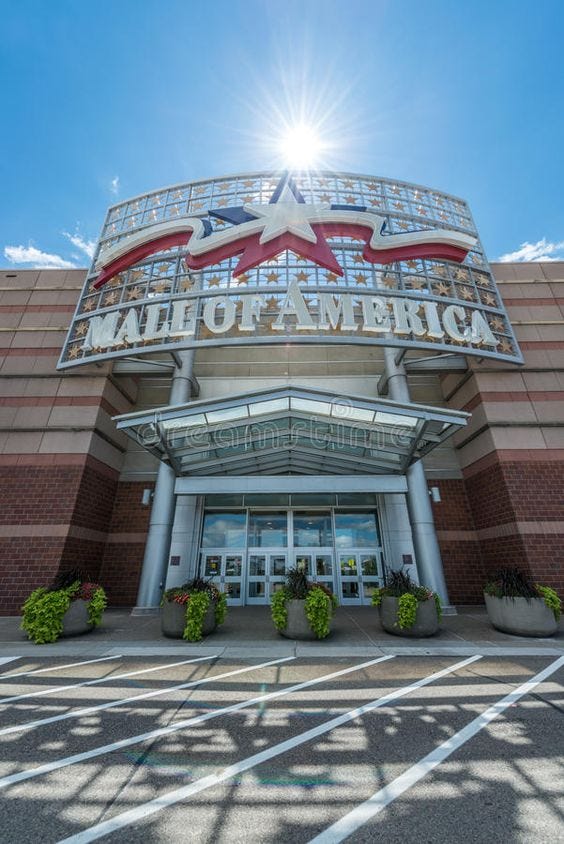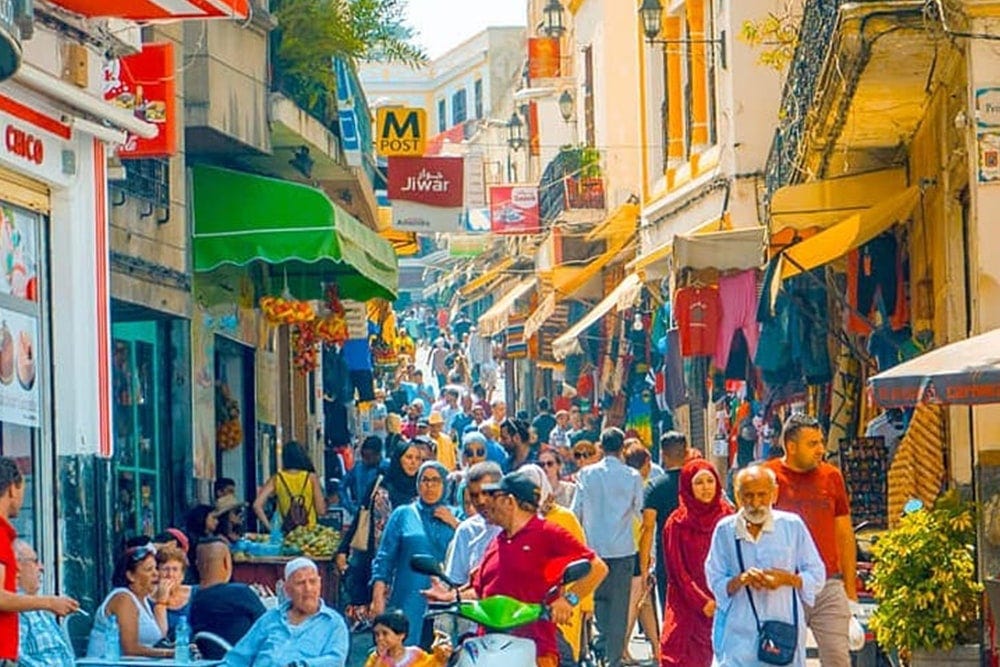My father loves malls. The grandeur, the sheer expanse of them. I can appreciate a shopping center like most people, for their practicality, for the flash of delightful overwhelm one experiences walking into one. Yet, as I walk the glistening marble floors and scan every passing kiosk and shop window, that overwhelm turns into overstimulation. The sweetness of the initial moment dissipates into a sickly saccharine imitation - artificial.
My father has always said this : as long as there is a McDonalds in the vicinity, you are still in civilization. This has always bemused my mom, who didn’t have a McDonalds in her hometown until she was in her early 20s. This marker for civilization - like his infatuation with shopping centers - is distinctly American.
For the overstimulation my mother and I feel, he feels normalcy - a brief break from the too quiet, subdued atmosphere of the European cities we frequented throughout my childhood. This is not to say that the United States is the only overstimulating country. Far from it. My mother spent her childhood learning how to haggle in the markets, negotiation being a prerequisite for calling yourself Moroccan.
But there is a stark difference between the souk and a shopping center. The markets back in Morocco are distinctly human, they brim with a life force so chaotic and lively that there is no choice but to access that part of yourself. The mall is the opposite. Cold, clinical and capitalistic. There is no negotiation there; no human interaction that exceeds the bare minimum.
The allure remains though - the dazzling appeal of convenience and consumerism. And, oddly enough, community.
The summer I was sixteen, I sat down with my family in a food court KFC in Fuengirola, Spain. It had been our first day in the town, and upon learning that there was a mall fifteen minutes away from our hotel, I had implored my mom not to tell my dad. She did anyway, and that lunchtime we squeezed ourselves into a cab and headed for the C.C Miramar.
I can admit that there’s a somewhat comforting familiarity to malls. The classic chains will be there; the number of which fluctuates on how close to the West you are. In Morocco, few chains had followed in McDonalds footsteps. Many of which had not opened a chain in Tangier until I was in middle school - until we had a mall of our own.
It was in that C.C Miramar KFC that my dad justified his love of malls. He claimed that they were the truest way to understand the people who lived locally. I couldn’t disagree more.
I spent my childhood summers waiting in my grandparents’ car as my mom and grandmother went to bargain in the souk. I was too shy to watch them argue with the shopkeepers I had too much shame, my grandmother would always say. And my father, well, he was too American. He was too American to understand the careful dance of haggling.
It was an art form, one I observed from behind the car windows. I rarely saw people back home like this, so impassioned, so free to disagree. I privately agreed with my grandmother. There was too much shame where I was from. There was no shame in getting a better price, but there was some in being American.
I’ve always felt more Moroccan than my brother, despite our 23 & me being nearly identical. I was the one who took my first steps in our grandparents’ apartment, right underneath our Godfather poster. I was the one who had Moroccan citizenship, among the first batch offered to those who were Moroccan through maternal lineage. I was the one who had suffered through enough Arabic school to manage halting, broken Arabic. It was this Arabic that helped me navigate my summers in Tangier. Paired with my school taught Spanish, I could get by.
My brother on the other hand could not speak a word. This was a problem, one that became apparent the summer after my freshman year. My mom had taken my brother and I on a spontaneous excursion to the Hercules Caves. These caves were supposedly where the Greek hero had rested in between his twelve labors. Its main allure was its mythological value - as well as the sea opening that perfectly mirrored the shape of Africa. The Hercules Caves were the source of many of my childhood daydreams and fables - and a convenient 10 minute drive from my grandma’s house.
Underneath the chalk cliffs surrounding the cave entrance, which I had always referred to as “popcorn walls”, was a man selling lamps. To anybody with cognitive reasoning and a familiarity with material, these lamps were cheaply made and destined to break in under 2 years. To my 7 year old brother, they were the resting spot of a genie.
My mom caved easily, pulling out a few dirhams to pay. She asked my brother which lamp he wanted, after which the man selling them indicated the price as twice what they were worth. Immediately, my mom’s face settled into the expression she held as she bargained a price down to a shred of the original ask. The first thing she said, which I will roughly translate from Arabic, was that she was from Tangier, not American, and that he shouldn’t mark the price up for her just because she spoke English. The man cut the price in half, and then subtracted a bit more as an apology. I watched in awe; my brother looked as if she had been speaking in tongues.
Being Americans in Morocco was much like being a comedic relief character in a TV show. Of course, the obvious exploitation of prices - but really, that was targeted at all tourists. Really, it was funny to my extended family members. Anybody who is not Moroccan might not understand the role that shame had in my family. Shame, or shouma, in the way my relatives used it was not the way that most English speakers understand it. It was more like shyness, a refusal to say what you want. In contrast to much of the world, my Moroccan family seemed to think America was a country riddled with shame. And, in many ways it was.
It always made me laugh, when white kids in my classes and the media in the newsstands on my way to school would consider Arab countries to promote shame culture to the extreme. Of course, Morocco is a country that veers more liberal than some of its Middle Eastern counterparts, but it still carries that reputation for oppression. It never made sense to me that my mother’s home country was considered oppressive or strict.
How could it be, when the women who flitted in and out of my grandmother’s sitting room talked loudly and surely - and laughed even moreso? How could it be, when my grandmother could strike fear into the heart of any shopkeeper as she haggled for a discount? How could it be that in a country so supposedly oppressive, that I - a young woman raised in the West, a girl with the loudest voice in my friend group- was considered a girl with a lot of shame, as someone who needed to speak up?
It fascinated and confused me simultaneously, how I could be given funny looks for eating or talking loudly in public back home, but I was urged to speak up and be assertive in Morocco. My supposed shyness was always, always, reduced to a factor of my Americanness.
But still, it wasn’t as if it was embarrassing to be American. The passport and accent came with a double-edged sword. There was, of course, an infatuation with American culture. My little cousins always begged for toys for the latest big movies they had seen. For them, toys were hard to find because of the scarcity of legitimate sellers in their town, a few hours from the city my mom grew up in. For us, it was hard to find because the movie they had just seen in theaters had been released months ago where we lived.
The American Dream lived on amongst the guests at our family reunions. There was a distant cousin in Virginia that I was constantly asked about. I had to explain each summer that the United States was so big that someone from New York probably wouldn’t cross paths with someone living in Virginia unless it was planned. Much like the Hercules Caves, America was mythologized. My uncle had posters of Times Square in his room as a teenager. There’s a photo of him seeing it in real life for the first time, taken shortly after my mom moved to New York to live with my dad. It’s nestled in one of our family photo albums, and it stops me everytime I flick through it. There was a look of awe in his eyes that I will never unsee. It’s also one I will probably never feel.
Perhaps it was this fascination for the spectacle of America that led to things changing in Tangier. My summers spent at the souk dwindled during my middle school years. Less than 10 minutes away from my grandmother’s house, a new mall spawned between summers. Chains that had never ventured into Morocco before had found themselves a home in the food court. Soon, I no longer had to wait in the backseat of the car as my mom bargained. Instead, I waited in the checkout area as the cashier bagged whatever we had picked up that day.
The mall was like many of the others my dad had dragged us to. But, unlike he claimed in the C.C Miramar KFC, this mall was not filled with normal locals. Instead of impassioned, occasionally sentimental shopkeepers, we had bored-looking cashiers, desperate to clock out of their shifts. The jam packed, well worn stalls of the souk were replaced by kiosks desperate to sell off custom phone cases and other plastic memorabilia. This was not the Morocco I knew. But, my dad, our family’s token American in-law, was entranced. This was home to him, filled with his idea of normal people. It was filled with America’s idea of a normal person, quietly scanning store windows, trapped in the air-conditioned blandness of a mall, ready to consume.







